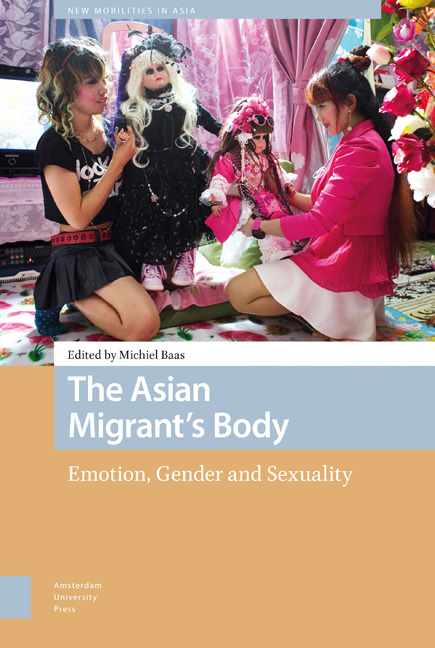Book contents
- Frontmatter
- Contents
- Introduction: Conceptualizing the Asian Migrant’s Body
- 1 ‘Not a Lesbian in Dubai, Not gay in Tehran’: Sexualities, Migrations, and Social Movements across the Gulf
- 2 Bodies at Work: Gendered Performance and Migrant Beer Sellers in Southeast Asia
- 3 Body, Space, and Migrant Ties: Migrant Domestic Workers and Embodied Resistances in Lebanon
- 4 The Day Off Policy , ‘Reverse Domestication’, and Emotional Labour among Indonesian Domestic Workers in Singapore: Maria Platt, Brenda S.A. Yeoh, Khoo Choon Yen, Grace Baey and Theodora Lam
- 5 Embodying the Good Migrant in Ageing: Negotiating Positive Subjectivities Through Paid Work
- 6 Proper Conjugation of Bodies: Chastity, Age, and Care Work in Sri Lankan Migrants’ Families
- 7 Border-crossing as Sexual Subjects: Interracial Dating Experience of Young Chinese in New Zealand
- 8 Managing Touch: The Racialized Dynamics of Intimacy in the Los Angeles Beauty Industry
- Notes on Contributors
- Index
7 - Border-crossing as Sexual Subjects: Interracial Dating Experience of Young Chinese in New Zealand
Published online by Cambridge University Press: 23 June 2021
- Frontmatter
- Contents
- Introduction: Conceptualizing the Asian Migrant’s Body
- 1 ‘Not a Lesbian in Dubai, Not gay in Tehran’: Sexualities, Migrations, and Social Movements across the Gulf
- 2 Bodies at Work: Gendered Performance and Migrant Beer Sellers in Southeast Asia
- 3 Body, Space, and Migrant Ties: Migrant Domestic Workers and Embodied Resistances in Lebanon
- 4 The Day Off Policy , ‘Reverse Domestication’, and Emotional Labour among Indonesian Domestic Workers in Singapore: Maria Platt, Brenda S.A. Yeoh, Khoo Choon Yen, Grace Baey and Theodora Lam
- 5 Embodying the Good Migrant in Ageing: Negotiating Positive Subjectivities Through Paid Work
- 6 Proper Conjugation of Bodies: Chastity, Age, and Care Work in Sri Lankan Migrants’ Families
- 7 Border-crossing as Sexual Subjects: Interracial Dating Experience of Young Chinese in New Zealand
- 8 Managing Touch: The Racialized Dynamics of Intimacy in the Los Angeles Beauty Industry
- Notes on Contributors
- Index
Summary
Abstract
Transnational migration shapes young people's sexual subjectivity in profound ways as cultural and racial borders are crossed. In this context, interracial relationships occupy an uneasy position in young Chinese’s lives against parental authority, patriarchal gender relations, nationalism, and assimilation. As a racial minority in New Zealand (NZ), the Chinese diaspora's notions of masculinity and femininity are both subjugated by racial stereotypes, constraining the possibilities of sexual expression and producing uneven power relations in intimate relationships. Simultaneously subject to assumptions of sexual sameness by co-ethnics and sexual difference by NZ society, Chinese young people must constantly negotiate the two tugging sets of racial relations in their practice of interracial dating. The entanglement of these power relations illustrates that being diasporic is simultaneously a racial/gendered/sexual project.
Keywords: transnational migration, sexual subjectivity, interracial relationships, patriarchy, gender
Introduction
Race constitutes an important power relation in the production of Chinese young diasporic sexual subjectivity. Racial relations incurred by migration underscore the (re)production of a sexual profile that otherises young Chinese diaspora as both conservative and reckless (Simon-Kumar 2009). Noted as the ‘sexual turn’, increasing attention in mobility studies has been given to the way ‘migrants and other “people on the move” are sexual beings expressing, wanting to express, or denied the means to express, their sexual identities’ (Mai and King 2009: 296). Interracial relationships, as personal practices as well as a phenomenon, sit at the nexus of sexuality and racial relations. Discussing interracial dating could therefore generate understandings for both sexuality and race, and more importantly, how the two aspects intersect in producing diasporic subjects.
I unpack my analysis in three parts in order to critically examine interracial relationships in the context of Chinese young people's transnational movement to Aotearoa New Zealand. I show that while interracial dating offers young Chinese people room for resisting oppressive sexual/gender norms, the practice is by no means simply liberating, as implied by problematic narratives of global mobility from ‘east’ to ‘west’ as entailing a move ‘from repression to freedom’ (Grewal and Kaplan 2001: 670). As a racial minority whose heritage culture is deemed ‘foreign’ or Other by the dominant society of New Zealand (NZ), young Chinese diaspora's sexual subjectification in interracial dating involves a complex navigation within racial power relations.
- Type
- Chapter
- Information
- The Asian Migrant's BodyEmotion, Gender and Sexuality, pp. 161 - 182Publisher: Amsterdam University PressPrint publication year: 2020

